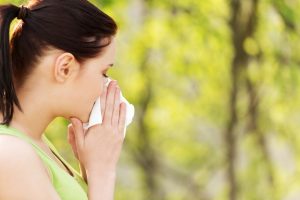Spring has officially sprung! Unfortunately for some the beautiful flowers and grassy fields are also accompanied by pesky hay fever symptoms. If the warmer weather has also brought about itchy eyes, a runny nose and sneezing you may want to understand more about hay fever and how it’s treated.
What causes hay fever?
Officially termed ‘allergic rhinitis’ hay fever is caused by an allergic response to allergens, such as:
- Pollen and grass
- Dust mites
- Fungal spores
- Mould
- Animal fur
- Occupational sources
Hay fever is the result of the body responding to something that it wrongly believes is a threat. The immune system responds to the above allergens by releasing a number of chemicals aimed at preventing the spread of this ‘threat’. These chemicals cause the typical symptoms of hay fever, such swelling inside the nose.
What are the symptoms of hay fever?
Some individuals are only affected by hay fever seasonally while others experience symptoms all year round. Common symptoms include:
- Mucous discharge (runny nose and watery eyes)
- Nasal congestion
- Itchiness and irritation
- Sneezing and sniffling
You may suffer from all or just some of the symptoms listed above depending on what you are allergic to and how often you encounter allergens.
Why are some people more susceptible?
The reason why some produce antibodies against pollen and others don’t is still largely unknown. Typically females in their 20’s are more susceptible to hay fever than other groups. Other factors include:
- Genetics: If one parent suffers from hay fever your chances increase by 50%, increased up to 80% if both parents have hay fever.
- Other conditions: If you also have eczema, dermatitis, asthma or other immune-related challenges.
- Delayed exposure to animals: Recent studies suggest that exposure to animals before the age of two may protect against allergies and asthma.
Treatment options
Good news is that there are a number of treatment options to alleviate the symptoms of hay fever. These include oral medications, nasal sprays and eye drops, many of which are available over the counter. Common treatments include:
- Antihistamines
Antihistamines are often the first-line treatment for mild or occasional hay fever. They are safe to use long term and are ideally taken before exposure to allergens.
- Intranasal steroid sprays
For those suffering with moderate to severe symptoms intranasal steroid sprays are often used. These sprays work as a “preventative” used daily to minimise allergic nose and even eye symptoms.
- Allergen-specific immunotherapy
For severe and prolonged hay fever symptoms which cannot be controlled with the above medications, immunotherapy is available.
Allergy immunotherapy is the closest “cure” for severe symptoms. It involves regular, and gradually increased, doses of allergen extracts. Over a long period of time it aims to change the way the immune system reacts to allergens.





